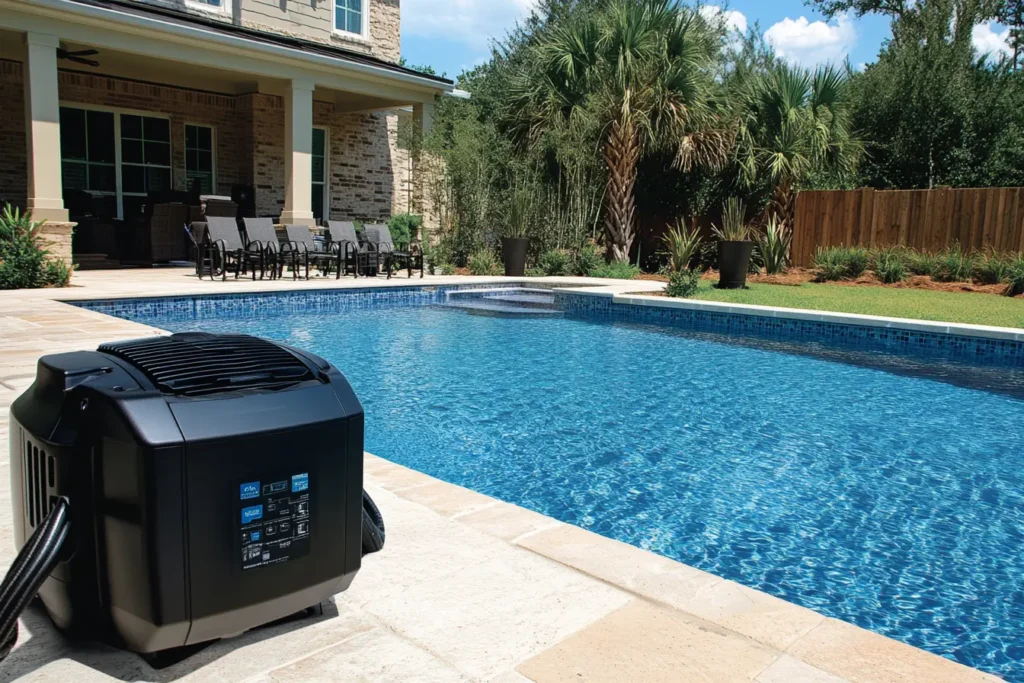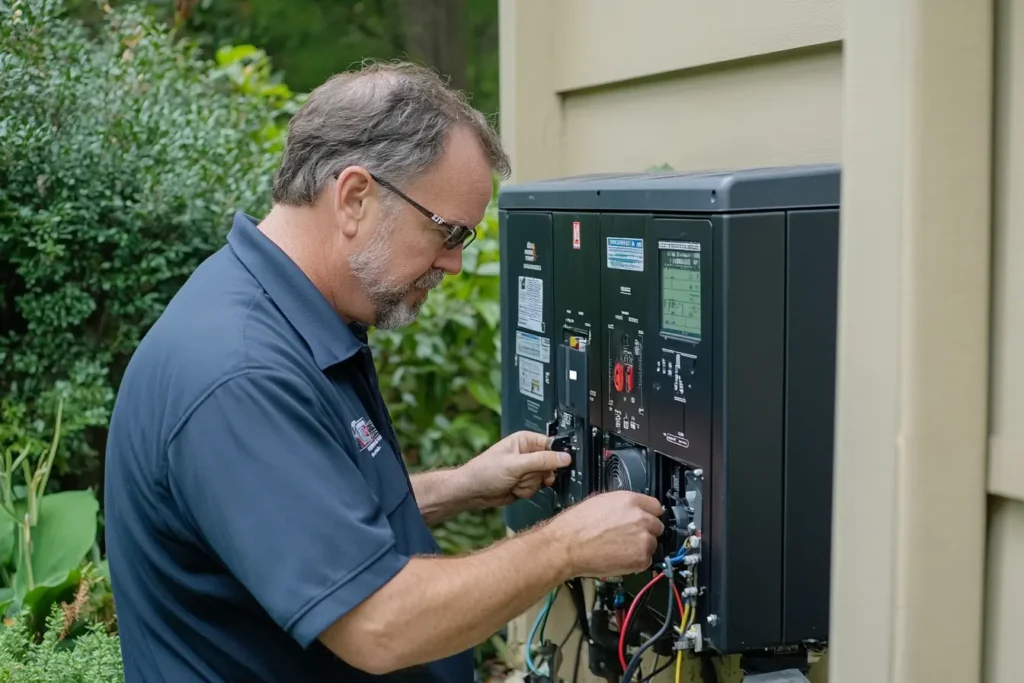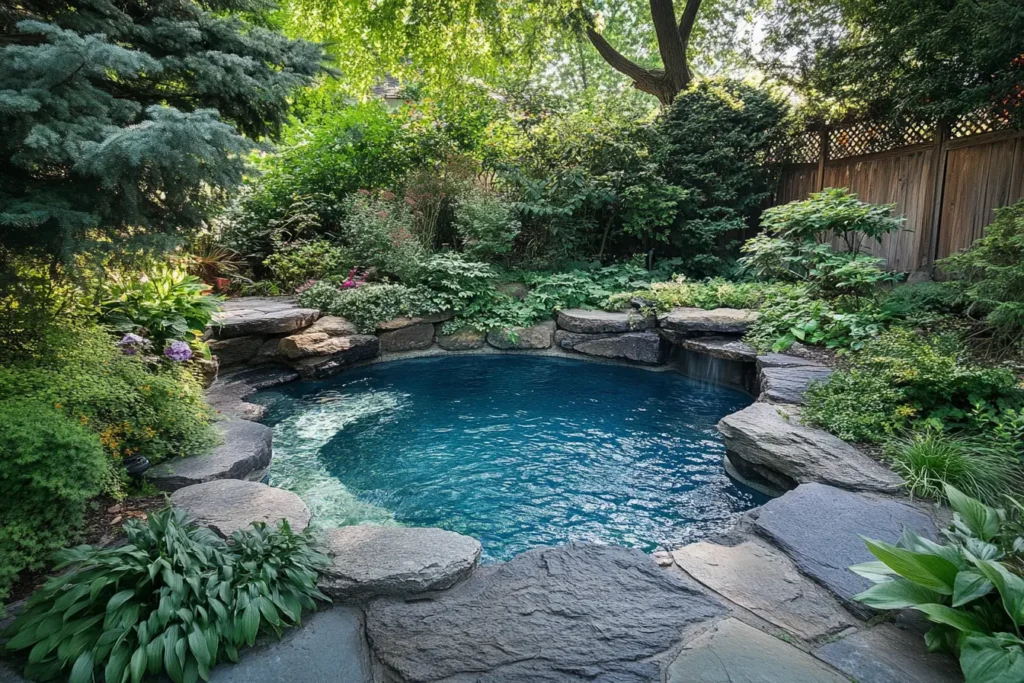As environmental awareness continues to rise, more homeowners in Richmond, Virginia, are looking for ways to make their homes more sustainable—including their pools. Pool ownership has traditionally been associated with high water and energy use, but eco-friendly pool options are becoming increasingly accessible. From energy-efficient equipment to sustainable water practices, Richmond homeowners can now enjoy their pools without sacrificing environmental responsibility.
This guide will walk you through the various eco-friendly pool options available, helping you create a sustainable backyard oasis.
Why Eco-Friendly Pools Are Gaining Popularity in Richmond
1. Rising Environmental Awareness
The growing movement toward sustainability in home improvement has reached Richmond. As more homeowners seek to minimize their ecological footprint, eco-friendly pool options provide an opportunity to combine luxury and responsibility. With Richmond’s mild summers and relatively short winters, pools are a popular addition to many homes. However, traditional pools can consume vast amounts of water and energy, leading to high utility bills and environmental costs.
By adopting green pool technologies and sustainable practices, homeowners can significantly reduce the impact of their pools while still enjoying them to the fullest.
2. Cost Savings Over Time
Many eco-friendly pool options not only reduce the environmental impact but also help homeowners save money in the long run. Energy-efficient pool equipment, solar heating, and water-saving systems can dramatically lower energy and water consumption. Although some options require an upfront investment, the reduction in energy bills and maintenance costs can offset these expenses over time.
For instance, switching to a variable-speed pool pump may initially cost more than a standard pump, but it can save up to 90% in energy usage, which adds up quickly over Richmond’s hot summer months.
Energy-Efficient Pool Equipment
1. Variable-Speed Pool Pumps
One of the most effective eco-friendly upgrades Richmond homeowners can make is switching to a variable-speed pool pump. Traditional single-speed pumps, which operate at full power regardless of the pool’s actual needs, are notorious for wasting energy. These pumps typically run at a single speed, often higher than necessary for basic tasks like filtering or circulating water. This overuse not only drives up energy bills but also shortens the lifespan of the pump due to continuous wear and tear at maximum speed.

In contrast, variable-speed pumps offer a much more efficient alternative. These pumps allow you to adjust the speed settings based on the pool’s requirements. For example, filtering water doesn’t require the same level of power as heating or cleaning the pool. By using a lower speed for less demanding tasks, variable-speed pumps drastically reduce energy consumption. The pump can be set to operate at slower speeds for basic filtration during the day and ramp up to higher speeds when necessary, such as during pool cleaning or heating.
Energy Efficiency and Cost Savings
In Richmond, where pools are in use for a significant part of the year, the energy savings from switching to a variable-speed pump can be considerable. On average, homeowners can reduce their pool pump energy use by up to 80%, depending on the size of their pool and the pump settings. Variable-speed pumps are designed to use less electricity overall, which can translate to hundreds of dollars in savings each year on energy bills.
Additionally, many energy companies and utility providers in Richmond and across the country offer rebates for homeowners who install variable-speed pumps due to their energy-saving benefits. This further offsets the initial cost of the pump, making it a smart long-term investment for both your wallet and the environment. In fact, some studies show that variable-speed pumps can pay for themselves in energy savings within just a few years.
Extended Pump Lifespan
Another major benefit of variable-speed pumps is their ability to extend the lifespan of the pump itself. Since these pumps don’t need to run at full speed all the time, they experience significantly less wear and tear compared to single-speed pumps. The reduced mechanical strain means fewer breakdowns and lower maintenance costs over time. In Richmond’s warm climate, where pools often operate year-round, this extended lifespan is a critical advantage, ensuring that homeowners get the most out of their investment.
Quieter Operation
In addition to their energy efficiency and durability, variable-speed pumps are much quieter than traditional single-speed models. Because they can run at lower speeds, they produce less noise during operation, creating a more peaceful and enjoyable pool environment for homeowners. This is especially beneficial in residential areas where noise from pool equipment can be a concern.
2. Solar Pool Heaters
Heating a pool can be one of the largest energy expenses for homeowners, especially during cooler months. For Richmond residents seeking an eco-friendly solution, solar pool heaters offer an excellent alternative by harnessing the power of the sun. Unlike traditional heaters, which rely on gas or electricity, solar heaters utilize natural energy to efficiently maintain pool temperatures throughout much of the year.
Solar pool heaters work by capturing sunlight through solar panels typically installed on rooftops or in open areas of the yard. These panels, often made from durable materials like polypropylene or rubber, absorb solar energy and convert it into heat. Pool water is then circulated through the panels, where it’s warmed by the sun before being returned to the pool. This process is not only environmentally friendly but also highly cost-effective in the long term.
Initial Investment vs. Long-Term Savings
While the initial installation cost of solar pool heaters can be higher compared to traditional gas or electric heaters, the long-term benefits make it a worthwhile investment. Once the system is installed, the energy used to heat the pool is essentially free, as it relies solely on sunlight. This can lead to virtually zero operational costs over time, as solar energy is abundant and renewable.
In Richmond, where the climate offers plenty of sunny days, a solar pool heater can efficiently maintain a comfortable pool temperature for much of the year. Homeowners can enjoy extended swimming seasons without worrying about skyrocketing utility bills. The savings on energy costs often allow homeowners to recoup the initial investment within just a few years, making solar pool heaters a cost-efficient and environmentally responsible choice.
Eco-Friendly Heating Solution
By choosing a solar pool heater, Richmond homeowners can significantly reduce their reliance on fossil fuels and minimize their carbon footprint. Traditional gas and electric heaters consume large amounts of energy, contributing to greenhouse gas emissions. In contrast, solar pool heaters produce no emissions, making them a clean, renewable energy option.

Additionally, solar pool heaters require minimal maintenance, as they have fewer moving parts compared to gas or electric systems. Most solar heaters are designed to last 15 to 20 years with proper care, providing decades of reliable service while contributing to environmental sustainability. This longevity and low maintenance further enhance the cost-effectiveness of solar heating solutions.
Year-Round Benefits
Even during cooler months, solar pool heaters can significantly extend the swimming season. In Richmond’s mild climate, where cold snaps are infrequent, the consistent use of solar energy can keep the pool warm and comfortable, allowing homeowners to enjoy their pool nearly year-round. During peak summer months, the system can maintain optimal temperatures without additional energy inputs, providing a consistent and enjoyable swimming experience.
Water Conservation Techniques
1. Pool Covers
An often-overlooked way to conserve water is by using a pool cover. Pool covers help reduce evaporation, which can lead to significant water loss, especially during Richmond’s hot, sunny days. By covering the pool when it’s not in use, homeowners can prevent the loss of hundreds of gallons of water per month. Additionally, covers help retain heat, reducing the energy needed to maintain the water temperature.
There are many types of pool covers to choose from, including solar covers that double as a passive heating source, helping warm the pool without additional energy input.
2. Rainwater Harvesting
For a truly eco-friendly approach, some Richmond homeowners are installing rainwater harvesting systems to refill their pools. Rather than relying solely on municipal water, these systems collect and store rainwater, which can then be filtered and used to top off the pool. Given Richmond’s relatively frequent rainfall, this is a practical way to reduce the demand on local water resources and lower water bills.
Environmentally Friendly Pool Designs
1. Natural Pools
Natural pools are becoming an increasingly popular choice among eco-conscious homeowners who seek a sustainable, chemical-free alternative to traditional pools. Unlike conventional pools that rely on chlorine and other chemicals to maintain water clarity and hygiene, natural pools use biological filtration systems to purify the water. These systems mimic natural bodies of water, leveraging the power of plants and microorganisms to create a healthy, balanced ecosystem.
In a natural pool, the water is filtered through a specially designed area known as a regeneration zone. This zone is filled with aquatic plants and beneficial bacteria that work together to break down organic matter and remove harmful contaminants. The clean water is then recirculated into the swimming area, providing a crystal-clear, safe, and chemical-free environment for swimmers.
Natural pools offer several key benefits over traditional pools, particularly in regions like Richmond where the outdoor landscape plays an important role in the home’s overall aesthetic. These pools blend seamlessly into the surrounding environment, often featuring a more organic shape with rocks, plants, and even waterfalls that create the look of a natural pond or lake. This design approach allows homeowners to maintain the beauty of their outdoor space while minimizing the visual and environmental impact of a conventional swimming pool.
Eco-Friendly and Low Maintenance
One of the greatest advantages of natural pools is their minimal environmental impact. By eliminating the need for chlorine, algaecides, and other pool chemicals, natural pools significantly reduce the release of harmful substances into the environment. Traditional pools often produce chemical byproducts that can pollute groundwater and soil, whereas natural pools rely on eco-friendly processes to maintain clean, safe water.

Additionally, while traditional pools require frequent chemical testing and manual adjustments, natural pools are largely self-sustaining. The plants and microorganisms in the regeneration zone do most of the heavy lifting, reducing the amount of maintenance required. Homeowners can enjoy a low-maintenance pool that naturally adapts to its environment, requiring only periodic cleaning and care for the plants.
Aesthetic Appeal and Health Benefits
For Richmond homeowners, the aesthetic appeal of natural pools is a significant selling point. These pools can be designed to complement the natural beauty of the area, creating a serene outdoor retreat. Unlike stark, rectangular pools, natural pools often have organic, flowing shapes and feature lush landscaping. Many natural pools include decorative elements such as rocks, waterfalls, and native plants, enhancing the overall ambiance of the space.
Moreover, natural pools offer health benefits that traditional pools simply can’t match. Chlorine and other chemicals used in conventional pools can irritate the skin, eyes, and respiratory system, especially for individuals with sensitivities or allergies. With a natural pool, swimmers can enjoy a chemical-free experience in water that feels more like a natural pond or lake, without the harsh side effects associated with chlorine exposure.
2. Smaller, More Efficient Pool Designs
When designing a new pool, consider opting for a smaller, more efficient design. While large pools can be luxurious, they require more water and energy to maintain. A smaller pool uses less of both, making it a more sustainable choice. Additionally, smaller pools are easier to heat and clean, further reducing their environmental impact.
Richmond homeowners can maximize their enjoyment while minimizing their footprint by choosing a pool size that suits their actual needs rather than defaulting to a larger design.
Sustainable Pool Chemicals and Filtration
1. Saltwater Pools
As discussed in our previous guide, saltwater pools offer a more eco-friendly option compared to traditional chlorine pools. Instead of adding chlorine directly to the water, a saltwater system uses electrolysis to generate chlorine from salt, resulting in a gentler and more consistent level of sanitation. This reduces the need for harsh chemicals and minimizes the risk of over-chlorination, which can harm the environment.
For Richmond homeowners who want a more natural swimming experience, a saltwater pool system is a great option. It requires less chemical input and provides a softer, more pleasant feel to the water.
2. Advanced Filtration Systems
Traditional pool filters can use a lot of energy, particularly if they’re not well-maintained. One way to make your pool more eco-friendly is to upgrade to an advanced filtration system, such as a cartridge filter or a DE (diatomaceous earth) filter. These systems are more efficient at removing contaminants from the water, meaning you don’t have to rely as heavily on chemicals to keep your pool clean.
Cartridge filters, for example, are known for their energy efficiency and require less backwashing than sand filters, conserving both water and energy. In Richmond, where pool season can extend for much of the year, having an efficient filtration system can save water and reduce your environmental impact over time.
Renewable Energy for Pools
1. Solar Pool Lighting
Solar-powered pool lights are an eco-friendly alternative to traditional electric lighting. These lights charge during the day using solar energy and illuminate your pool area at night, reducing the need for electricity. Not only do they lower energy consumption, but they also add ambiance to your pool area without adding to your utility bill.
In Richmond, where sunny days are plentiful, solar pool lighting is a smart and sustainable way to keep your backyard well-lit and eco-friendly.
2. Solar-Powered Pool Pumps
In addition to solar heaters and lighting, solar-powered pool pumps are another way to reduce your pool’s energy consumption. These pumps run entirely on solar energy, which means they operate at no cost once installed. They’re ideal for Richmond’s climate, as they can function efficiently during the long summer days when energy demands are highest.
While solar-powered pool pumps require a higher initial investment, they can lead to significant energy savings over time, reducing both your carbon footprint and your energy bills.
The Benefits of Eco-Friendly Pools for Richmond Homeowners
- Lower Environmental Impact: Eco-friendly pools consume less water and energy, helping reduce your household’s overall environmental footprint.
- Cost Savings: Energy-efficient equipment and water-saving techniques can lead to lower utility bills over time, helping offset any upfront costs associated with eco-friendly upgrades.
- Healthier Swimming Environment: Pools that use natural or low-chemical filtration systems offer a cleaner, healthier swimming environment for your family.
- Increased Property Value: As more homebuyers seek sustainable features, an eco-friendly pool can be a selling point that adds value to your home in Richmond.
Questions & Answers
What are the most eco-friendly pool options?
Eco-friendly pool options include natural pools, saltwater pools, and energy-efficient designs. Using solar heaters, variable-speed pumps, and advanced filtration systems can also reduce the environmental impact of traditional pools.
How can I make my existing pool more eco-friendly?
You can make your existing pool more eco-friendly by upgrading to energy-efficient equipment, such as a variable-speed pump or solar heater. Installing a pool cover, reducing chemical use, and conserving water with rainwater harvesting systems are additional steps you can take.
Are natural pools difficult to maintain?
Natural pools do require more planning and specialized design, but they can be easier to maintain in the long term since they use biological filtration systems. Once established, they require less chemical maintenance than traditional pools.
Conclusion
Eco-friendly pool options are becoming more accessible for Richmond homeowners, allowing you to enjoy the benefits of pool ownership without compromising on sustainability. Whether you opt for energy-efficient equipment, water-saving techniques, or natural filtration systems, there are numerous ways to reduce your pool’s environmental impact. By investing in eco-friendly solutions, you’ll not only lower your utility bills but also contribute to a healthier planet.



